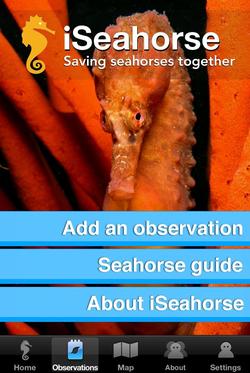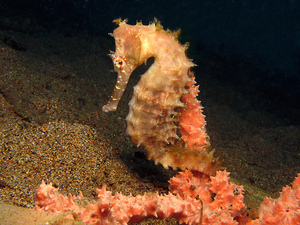Around the world, seahorses have a large fan base. Most people can't help but be charmed by their equine heads and prehensile tails, or be fascinated by their behavior -- the males give birth! And now we have a tool that concerned citizens can use to help these remarkable animals survive in a rapidly changing ocean.
(Image credit: Shedd Aquarium)
Slow-moving seahorses have limited home ranges and typically mate for life, making them especially vulnerable to overfishing, habitat loss and destructive fishing practices such as trawling. Dried seahorses are traded for traditional medicine and as curios, and live animals are highly desired for home aquariums. This trade is global and complex, involving millions of animals and more than 80 countries. Currently, many seahorse species are considered "threatened" on the International Union for Conservation of Nature (IUCN) Red List, and all species are listed under Appendix II of the Convention of International Trade in Endangered Species of Wild Fauna and Flora (CITES). Many more are listed as 'Data Deficient' because we simply do not know the extent to which they are threatened. This is because seahorses are small, hard to find, and live in many types of habitats.
That's why I'm excited to share the news that Shedd Aquarium, Project Seahorse, the University of British Columbia and the Zoological Society of London have launched iSeahorse, an online citizen science platform that will harness the collective power of seahorse and ocean enthusiasts around the world. Through iSeahorse, we can develop a more comprehensive picture of seahorse populations around the world, one seahorse sighting at a time. This big-picture approach will inform new scientific research and practical conservation measures that benefit seahorses and the ocean environments they inhabit.
iSeahorse allows anyone, anywhere in the world to contribute to seahorse science and conservation with just a few clicks of a mouse or taps on a smartphone. iSeahorse harnesses the power of citizen scientists -- divers, photographers, researchers, conservation groups and other wildlife enthusiasts around the world -- to improve our understanding of these elusive and threatened animals. This grassroots, crowdsourced program can have potentially large effects on policy and management. The platform offers a dual strategy for advancing seahorse conservation. The most accessible input to iSeahorse involves entering your seahorse sightings with a few quick keystrokes, where you become part of the iSeahorse community tracking and identifying seahorses. The second, more in-depth way to participate is by inputting survey data using standardized methods that can be downloaded from an online toolkit (functionality will be added soon). Whichever way you choose, iSeahorse contributors will receive feedback on their data from seahorse conservation experts and will learn how they play a vital role in advancing targeted ecological studies and informing large-scale sustainable management initiatives.
 The iSeahorse platform serves as a bridge between the scientific community and general public, allowing everyone to contribute to seahorse conservation in a meaningful way. iSeahorse users will help scientists establish long-term monitoring sites, as well as record trends of seahorse populations around the world. We also hope that by creating an easily accessible, high-impact tool, the use of iSeahorse will inspire citizen science initiatives for other marine species.
The iSeahorse platform serves as a bridge between the scientific community and general public, allowing everyone to contribute to seahorse conservation in a meaningful way. iSeahorse users will help scientists establish long-term monitoring sites, as well as record trends of seahorse populations around the world. We also hope that by creating an easily accessible, high-impact tool, the use of iSeahorse will inspire citizen science initiatives for other marine species.
The program is quick and easy to use -- and it's already having impacts. In Southeast Asia, Dr. Tse-Lynn Loh, a Shedd Aquarium and Project Seahorse postdoctoral researcher, is conducting iSeahorse workshops and acting with government agencies and communities to establish long-term field research sites for the region's seahorse conservation community using in part data from iSeahorse. We are excited to witness the growth of this powerful conservation tool and encourage all of you to become participatory stewards of seahorses and our oceans.
Support HuffPost
Our 2024 Coverage Needs You
Your Loyalty Means The World To Us
At HuffPost, we believe that everyone needs high-quality journalism, but we understand that not everyone can afford to pay for expensive news subscriptions. That is why we are committed to providing deeply reported, carefully fact-checked news that is freely accessible to everyone.
Whether you come to HuffPost for updates on the 2024 presidential race, hard-hitting investigations into critical issues facing our country today, or trending stories that make you laugh, we appreciate you. The truth is, news costs money to produce, and we are proud that we have never put our stories behind an expensive paywall.
Would you join us to help keep our stories free for all? Your contribution of as little as $2 will go a long way.
Can't afford to donate? Support HuffPost by creating a free account and log in while you read.
As Americans head to the polls in 2024, the very future of our country is at stake. At HuffPost, we believe that a free press is critical to creating well-informed voters. That's why our journalism is free for everyone, even though other newsrooms retreat behind expensive paywalls.
Our journalists will continue to cover the twists and turns during this historic presidential election. With your help, we'll bring you hard-hitting investigations, well-researched analysis and timely takes you can't find elsewhere. Reporting in this current political climate is a responsibility we do not take lightly, and we thank you for your support.
Contribute as little as $2 to keep our news free for all.
Can't afford to donate? Support HuffPost by creating a free account and log in while you read.
Dear HuffPost Reader
Thank you for your past contribution to HuffPost. We are sincerely grateful for readers like you who help us ensure that we can keep our journalism free for everyone.
The stakes are high this year, and our 2024 coverage could use continued support. Would you consider becoming a regular HuffPost contributor?
Dear HuffPost Reader
Thank you for your past contribution to HuffPost. We are sincerely grateful for readers like you who help us ensure that we can keep our journalism free for everyone.
The stakes are high this year, and our 2024 coverage could use continued support. If circumstances have changed since you last contributed, we hope you’ll consider contributing to HuffPost once more.
Already contributed? Log in to hide these messages.

 The iSeahorse platform serves as a bridge between the scientific community and general public, allowing everyone to contribute to seahorse conservation in a meaningful way. iSeahorse users will help scientists establish long-term monitoring sites, as well as record trends of seahorse populations around the world. We also hope that by creating an easily accessible, high-impact tool, the use of iSeahorse will inspire citizen science initiatives for other marine species.
The iSeahorse platform serves as a bridge between the scientific community and general public, allowing everyone to contribute to seahorse conservation in a meaningful way. iSeahorse users will help scientists establish long-term monitoring sites, as well as record trends of seahorse populations around the world. We also hope that by creating an easily accessible, high-impact tool, the use of iSeahorse will inspire citizen science initiatives for other marine species.